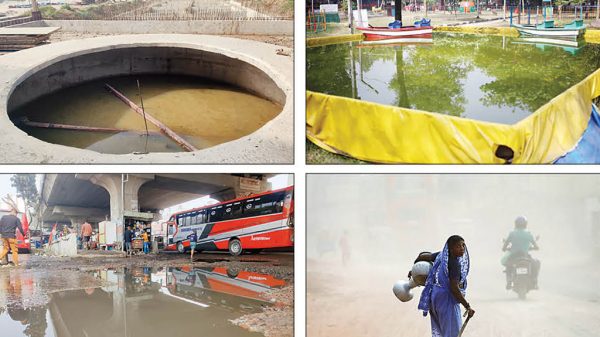Health Hazards caused by environment pollution: Public entities face no action

Shawdesh Desk:
Lack of concern about public health among government agencies and inaction of the monitoring agencies continue degrading environment, bringing harmful impact on the city dwellers, particularly the residents of Dhaka city.
In a latest instance, the environment, forest and climate change ministry on December 10 issued a rare warning about the hazardous air pollution in Dhaka and elsewhere in the country, asking people to wear masks while going outdoors.
Not only air pollution, dengue and rampant water pollution are also taking toll on public health for which public agencies are significantly responsible.
But monitoring agencies hardly make public agencies accountable for their environment pollution, although at different times they have imposed penalties on private establishments and businesses for such offences.
Dilapidated roads and road digging for development works by different public agencies remain a constant source for air pollution, particularly in the capital and other cities. At the same time, water gathered in the potholes of the rundown roads and alleyways and also in the dug-up ground provides active breeding grounds for dengue vector Aedes mosquito.
In Dhaka city only, several hundred roads maintained by the South and North Dhaka city corporations remain derelict over the years becoming a source of constant acute air pollution, causing respiratory diseases and other health hazards.
Md Yasin Rana, a resident of Dakkhin Khan under the Dhaka North City Corporation, lamented their terrible suffering, saying that the dust-laden air, caused by the locality’s worn-out roads which had seen no retouch for years, triggered suffocation and itching and other problems in eyes, among other health hazards.
Anower Hossain, a trader having his clothing store around Shait-foot Road in Mirpur, also under Dhaka North City Corporation, also complained about similar health problem, adding that his goods got regularly damaged in the dust.
Burning of waste in the dumping grounds as well as biomass on the premises of different government offices in the capital also are among the active source of air pollution. Instead of managing waste in a fully systematic and safe way, Dhaka South and Dhaka North City Corporations staff burn garbage on road in the two dumping yards in the capital at Amin Bazar and Matuail, polluting air sometimes round the clock, creating choking smoke.
Many of the offices of the public agencies, including public hospitals, Bangladesh Betar, Dhaka Water Supply and Sewerage Authority, Bangladesh Meteorological Department, and forest department, have the leaves and twigs gathered from their premises regularly burnt creating billowing smoke, causing health hazards for the residents around.
Unfit vehicles of the public agencies are also a potential source of air pollution particularly in the capital. Staff buses of Bangladesh Road Transport Corporation, Bangladesh Inland Water Transport Corporation, Bangladesh police, and other agencies are regularly found to release black smoke.
But public agencies and offices have rarely been made accountable for causing air pollution as Department of Environment director Md Ziaul Haque admitted that they had never booked the city corporations for the pollution caused by the dilapidated city roads or at the waste dumping yards or by other government agencies.
But the environment department fined several hundred businesses or individuals for air pollution in the past five years.
On air pollution from biomass burning, Bangladesh Poribesh Andolon joint secretary and Stamford University Bangladesh department of environment professor Ahmad Kamruzzaman Majumder said that burning dead leaves and twigs was a major cause of air pollution in Dhaka city and elsewhere in the country.
But no monitoring agencies have taken any steps to stop biomass burning, a relatively easier step to take, remarked the professor.
A lack of cleanliness and maintenance often makes the premises of different government offices the perfect breeding grounds for dengue carrier Aedes mosquitos.
Data show that the city corporations spent over Tk 200 crore to control dengue in the past three years.
The city authorities, including the two Dhaka city corporations, occasionally conduct mobile courts against Aedes breeding spots and fine businesses and individuals for hosting potential breeding spots. But their own office compounds, along with other public offices, including those of Bangladesh Water Development Board, Civil Aviation Authority, different government educational institutions, national parliament, and even the Secretariat, have been found with potential breeding spots.
Dhaka south city officials said that they had repeatedly asked the government agencies situated in their jurisdiction to keep their premises clean to prevent mosquito breeding. Their call mostly fell on deaf ears, they said.
According to the Directorate General of Health Services data, on Sunday (15 December) at least 548 people died of dengue and over 98,877 people hospitalised with the fever.
Green activist and Waterkeepers Bangladesh coordinator Sharif Jamil said that government institutions had more responsibility than any individuals and corporates to comply with laws and so should face exemplary punishment for seriously polluting environment.
He said that government studies identified public entities like Dhaka WASA and the two city corporations as responsible for 30 per cent of the total pollution in rivers surrounding the capital. But the agencies were never made accountable for their misdeeds.
‘Indemnity to the public agencies has made them desperate to break rules, increasing health hazards,’ he said.
By holding the public agencies accountable, pollution, particularly in the capital and other cities can be substantially reduced, experts observe.























Leave a Reply